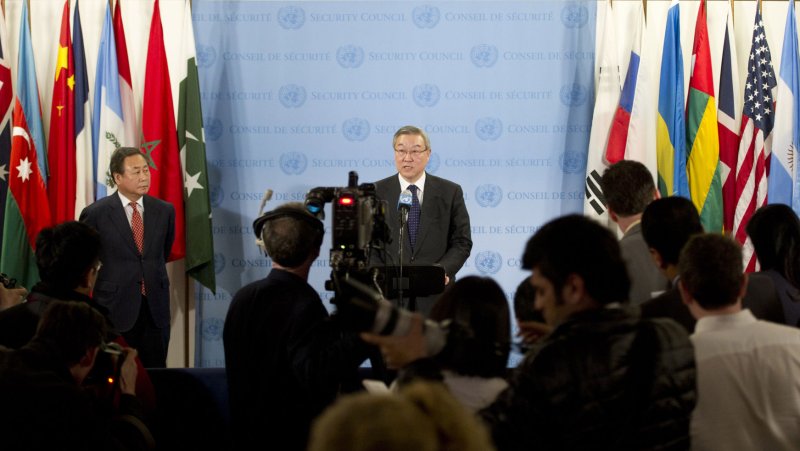1 of 3 | Kim Sung-hwan Minister for Foreign Affairs and Trade of the Republic of Korea and President of the Security Council for the month of February, delivers a Council press statement strongly condemning the nuclear test conducted by the Democratic PeopleÕs Republic of Korea at the U.N. in New York City on February 12, 2013. The statement indicated that Council members would begin work immediately on appropriate measures in a Security Council resolution. UPI/Mark Garten/HO |
License Photo
PYONGYANG, North Korea, Feb. 12 (UPI) -- The U.N. Security Council Tuesday unanimously condemned North Korea's latest nuclear test and promised "appropriate measures."
The condemnation by all 15 nations on the council came in the late morning, South Korea, which hold the rotating presidency, said.
"In line with this commitment and the gravity of this violation, the members of the Security Council will begin work immediately on appropriate measures in a Security Council resolution," South Korean Foreign Minister Kim Sung-hwan said.
Earlier Tuesday in Beijing, China summoned the North Korean ambassador to China to express dissatisfaction with the nuclear test, CNN quoted the Chinese Foreign Ministry as saying in a statement.
Also earlier Tuesday, the North Korean Foreign Ministry said in a statement the test was a defense action against the United States for its "hostile activity against North Korea."
It was the first nuclear test carried out under the North's young leader, Kim Jong Un.
The test also drew swift criticism from world leaders who condemned it as a provocative act that threatened world peace.
Hours after seismic activity was detected at North Korea's Punggye-ri nuclear test complex, North Korea's Central News Agency said the test used a smaller nuclear device compared to two previous nuclear tests and was conducted in a safe manner that wasn't harmful to the surrounding environment.
It is the country's third nuclear test since 2006.
Once confirming the nuclear test occurred, South Korea said in a statement the test violated U.N. Security Council resolutions.
The nuclear test "is an unacceptable threat to peace and security on the Korean Peninsula and in the region and a head-on challenge to the international community," the statement said. "North Korea won't be able to avoid grave responsibility."
In a statement issued early Tuesday, U.S. President Barack Obama said the test "is a highly provocative act that, following its Dec. 12 ballistic missile launch, undermines regional stability, violates North Korea's obligations under numerous United Nations Security Council resolutions, contravenes its commitments under the Sept. 19, 2005, Joint Statement of the Six-Party Talks, and increases the risk of proliferation."
While threatening international peace and security, North Korea's weapons and missile programs don't make North Korea any more secure, Obama said, pledging the United States would take the steps necessary to defend itself and its allies.
"Far from achieving its stated goal of becoming a strong and prosperous nation, North Korea has instead increasingly isolated and impoverished its people through its ill-advised pursuit of weapons of mass destruction and their means of delivery," Obama said. "The danger posed by North Korea's threatening activities warrants further swift and credible action by the international community."
Later, in his State of the Union address, Obama admonished North Korea again, saying the country "will only achieve security and prosperity by meeting their international obligations. Provocations of the sort we saw last night will only isolate them further, as we stand by our allies, strengthen our own missile defense, and lead the world in taking firm action in response to these threats."
China said it "resolutely opposes" the test while Germany said more sanctions against North Korea should be considered, CNN reported.
In a statement, China's Ministry of Foreign Affairs said: "Holding up peace and stability in Northeast Asia is China's resolute position. We strongly urge [North Korea] to abide by [its] promise to denuclearize and take no further action that will worsen the situation."
South Korean President-elect Park Geun-hye called the nuclear test a "serious threat to the peace of the Korean Peninsula and the world, and it has hampered the credibility between the South and North."
In his statement, Japanese Prime Minister Shinzo Abe said North Korea's nuclear testing represented a "grave threat" to Japan and a "serious challenge" to international disarmament framework based on the non-nuclear proliferation treaty.
"We can never tolerate as it significantly compromise[s] the peace and safety of northeast Asia and the international society," Abe said.
Statements of condemnation were lodged by other countries such as Britain, Australia, France and Germany, CNN said.
In a statement from the German Foreign Office, Foreign Minister Guido Westerwelle said he "strongly condemns" North Korea's nuclear test, adding the international community "should consider further sanctions against the regime."
U.N. Secretary-General Ban Ki-moon called the nuclear test a "clear and grave violation" of several Security Council resolutions.
"It is deplorable that Pyongyang defied the strong and unequivocal call from the international community to refrain from any further provocative measures," Ban said in a statement issued by his office.
The statement said Ban was "gravely concerned about the negative impact of this deeply destabilizing act on regional stability as well as the global efforts for nuclear non-proliferation" and urged North Korea to "reverse course and work toward de-nuclearization of the Korean Peninsula."
He also said he was confident the Security Council "will remain united and take appropriate action."
Yukiya Amano, the director general of the International Atomic Energy Agency, said the U.N. nuclear watchdog was ready to work toward a peaceful resolution through nuclear verification activities in the country "as soon as the political agreement is reached among countries concerned," CNN said.
NATO also condemned North Korea's nuclear test, calling it an "irresponsible act."
"North Korea's pursuit of weapons of mass destruction represents continued defiance of the U.N. Security Council and the broader international community," the alliance said.















